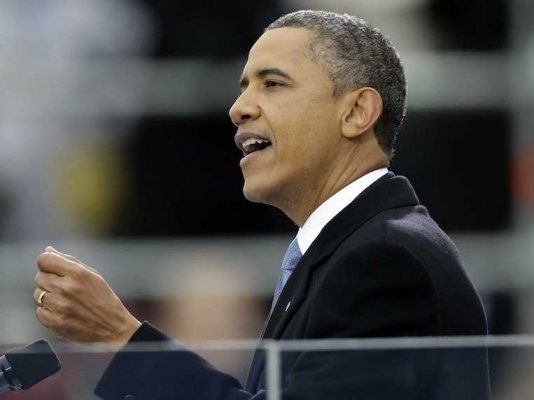
In his highly-anticipated second inaugural speech Monday, President Barack Obama signaled that he will take a more aggressive approach to achieving his liberal policy goals, opening up a new, more assertive chapter of his presidency as he begins his second term.
The address was by far the most liberal speech Obama has given as President, presenting a forceful case for the progressive priorities that he championed during the 2012 presidential campaign and plans to push through in his final four years in office.
The paragraph below sums up the gist of Obama’s message:
"It is now our generation’s task to carry on what those pioneers began. For our journey is not complete until our wives, our mothers, and daughters can earn a living equal to their efforts. Our journey is not complete until our gay brothers and sisters are treated like anyone else under the law – for if we are truly created equal, then surely the love we commit to one another must be equal as well. Our journey is not complete until no citizen is forced to wait for hours to exercise the right to vote. Our journey is not complete until we find a better way to welcome the striving, hopeful immigrants who still see America as a land of opportunity; until bright young students and engineers are enlisted in our workforce rather than expelled from our country. Our journey is not complete until all our children, from the streets of Detroit to the hills of Appalachia to the quiet lanes of Newtown, know that they are cared for, and cherished, and always safe from harm."
In those five sentences, Obama lays out his top liberal policy goals — equal pay for women, gay rights, voting rights, immigration reform, and gun control — and ties them together within the broader theme of his speech: That personal responsibility and individualism do not countermand the responsibility that we have to one another.
That message is at the heart of the partisan gridlock that has marked Obama’s past two years in office. Since 2010, debates over the deficit, government spending, and healthcare (among others) have become proxy battles over the role that the federal government should play in protecting the nation’s most vulnerable.
In the past, Obama has used moments like this to make lofty calls for the end of "the politics of division" and a "balanced approach" to solving the country’s problems.
Those bipartisan appeals were largely absent from Monday’s speech. Fresh off of a grueling campaign and tortuous budget battles with House Republicans, Obama took a more hardheaded, realistic approach, sending the message that he will no longer accept divided partisan politics as an excuse for inaction.
Here’s the key paragraph:
For now decisions are upon us, and we cannot afford delay. We cannot mistake absolutism for principle, or substitute spectacle for politics, or treat name-calling as reasoned debate. We must act, knowing that our work will be imperfect. We must act, knowing that today’s victories will be only partial, and that it will be up to those who stand here in four years, and forty years, and four hundred years hence to advance the timeless spirit once conferred to us in a spare Philadelphia hall.



